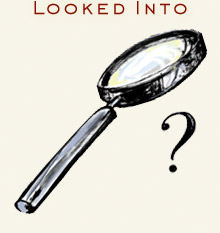Emdashes—Modern Times Between the Lines
The Basics:
About Emdashes | Email us
Ask the Librarians
Best of Emdashes: Hit Parade
A Web Comic: The Wavy Rule
Features & Columns:
Headline Shooter
On the Spot
Looked Into
Sempé Fi: Cover Art
Like a Child, You Whisper Softly to Me
Filed under: Looked Into Tagged: Adam Gopnik, books, Galway Kinnell, movies, Peter Mueller, poetry

(I don’t want to push the librarians off the homepage just yet, so here’s a later Friday update.) In my darling hometown alternative paper, the Madison Isthmus, P.S. Mueller dishes on what it’s like to be in The Rejection Collection and on traveling with the likes of Matt Diffee, cartooning for The New Yorker, and what kind of graphic novel he’d be if he were a graphic novel.
Adam Gopnik’s new book is out, so there are reviews aplenty: in the Seattle Times and The New York Times, for instance. The quick-footed reporter from the Seattle Post-Intelligencer landed the interview.
The Times (of New York) recently printed a sort of Civil War list of the dead of closed New York bookstores, including the New Yorker Bookshop but not, for some reason, the late Endicott of Columbus Avenue, which was always my favorite. Jurgen Habermas, my elbow. (That goes double for you, Joan Didion! You should know better!) Lest you forget this is an ongoing erosion, this is a very recent Yahoo article: “Indie Bookstores Fight Chains, Internet.” Here’s someone’s bookstore hall of fame; all the stores are squeaking, Save us! Also, as Book Sense’s Carl Lennertz told the Voice in 2002, “Why does the press only write about independents when they’re about to close?” The esssay by Ed Park about the life of New York’s small bookshops is worth reading.
Speaking of the world going to the dogs, the New Statesman declares quite rightly, “Give Poetry Back to People”:More people write poetry than go to football matches, and poetry is popular in schools, at festivals and at the hundreds of readings staged every week in pubs, theatres, arts centres and even people’s homes. Poetry has reached a wider audience through films, radio, television and the internet, as well as through initiatives such as London’s Poems on the Underground, which has been imitated around the world. More people than ever believe, as Jackie Kay wrote in her National Poetry Day blog, that “poetry makes us think about who we are”.Damn straight!
…
Readers don’t have access to the diverse range of work being produced, not just in Britain, but from around the world, because much of the poetry establishment is narrowly based, male- dominated, white Anglocentric and skewed by factions and vested interests. Too often, poetry editors think of themselves and their poet friends as the arbiters of taste, selecting only writers they think people ought to read. They are unresponsive to much poetry by women (who comprise more than two-thirds of poetry’s readership) as well as to writing from Britain’s rapidly growing ethnic minorities. Ignoring the readership would be commercial suicide in any other field, but this malpractice in poetry publishing and reviewing has survived into the 21st century thanks to “academic protectionism”. This is something that has also tainted poetry reviewing: the few reviews that do appear are mostly of books by the same small group of mostly male, white British poets who also judge the main poetry prizes and are often either poetry editors or academics in university departments of English or creative writing.
Editors’ “personal taste” is too often an excuse or disguise for elitism and arrogance. In my view, my responsibility as an editor is to be responsive to writers and readers, and to give readers access to a wide range of world poetry. Publishers and writers who address a broader readership (as Bloodaxe has done with Staying Alive and other anthologies) are attacked by elitist critics for “dumbing down” - but receive overwhelming support from readers as well as from intelligent poets. Contemporary poetry has never been more varied, but what the public gets to hear about are the new post-Larkin “mainstream” and the “postmodern avant-gardists” (with their academic strongholds in Oxford and Cambridge respectively). More broad-based poetry expressing spiritual wisdom, emotional truth or social and political engagement is of little interest to either camp. Exciting new work by major American, European and Caribbean writers, from Martin Carter, Galway Kinnell and Yusef Komunyakaa to Jane Hirshfield, Mary Oliver and Adam Zagajewski, has been almost totally ignored by national-press poetry reviewers. Continued.
Speaking of England, they must not have gotten the telegram that everyone who’s anyone must get in on the Franzen backlash, because the Independent has quite a positive review. Also, I strongly suggest that you read Andrew O’Hehir’s review in Salon of Jonestown: The Life and Death of People’s Temple. Chilling.




Comments
Yes, it is damn straight, and I agree. There was a time when a new book of poems by Seamus Heaney, say, would be the occasion for a great, original review by Helen Vendler in The New Yorker. My god, Vendler could write! These days, the only poetry reviewing in the magazine is about books about Walt Whitman, Hart Crane, etc. Ugh!
Ha, I just passed one of those dead bookstores, can’t remember the name, it was on 19th street, very pretty wood and glass storefront attracted my eyes to it. I felt like I was in that last scene of the Planet of the Apes…. “We finally really did it. You Maniacs! … Damn you! God, Damn you all to hell!”
(The irony of that sighting was that I was actually walking with a friend who told me, “I’m going to the bookstore.” I actually asked, “which bookstore?” before following up with, “as if there were any others left besides Barnes & Noble.”